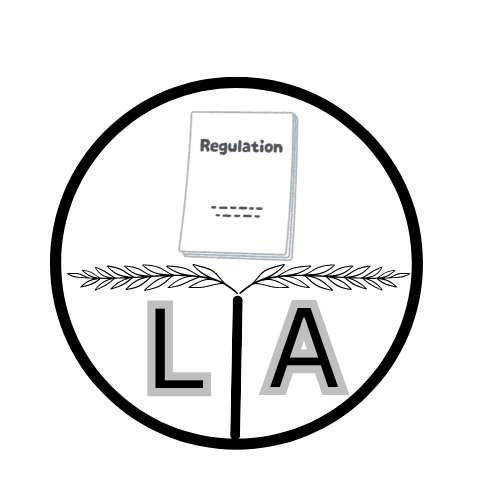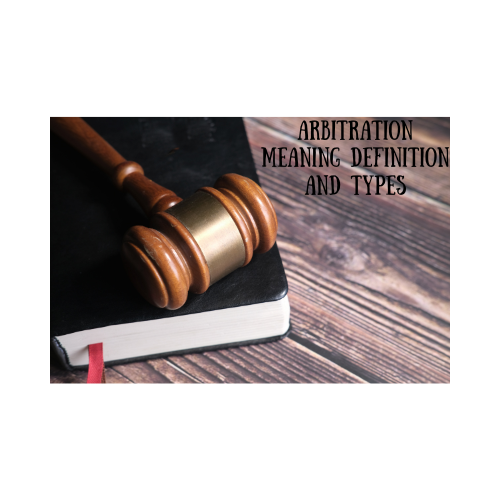Arbitration meaning definition and types
Welcome to Law Adhoc Tutorials !
These notes are in easy language and easy to remember.
Law Adhoc Tutorials is an education platform. It helps law students get high quality notes to make their study easier. Law Adhoc Tutorials provides full and completes notes for free for each subjects of law.
Arbitration meaning definition and types
Arbitration
Introduction
Arbitration is a procedure in which a dispute is submitted, by agreement of the parties, to one or more arbitrators who make a binding decision on the dispute. In choosing arbitration, the parties opt for a private dispute resolution procedure instead of going to court.
Meaning
Arbitration is one of the forms of Alternative Dispute Resolution (also referred to as appropriate or amicable dispute resolution). Arbitration is one of the prominent forms of ADR and is a type of private court where parties resolve their disputes without taking them to court. This form of ADR is commonly used in disputes that are commercial in nature, especially international commercial transactions, because of its time and cost- effective nature.
Contractual parties insert an “arbitration clause” in their contracts, where they specifically mention and appoint a neutral third party referred to as the “arbitrator” , to whom a dispute shall be referred if parties to the contract violate any provisions of the contract.
Definitions
Section 2 (1)(a) of the Act defines arbitration as to any arbitration which is either administered or not by a permanent arbitral institution.
It is an alternative to litigation in courts and is advantageous as it provides flexibility and confidentiality.
According to Black Law Dictionary, it means a method of resolving disputes which includes two parties and a neutral third party whose decision is binding on both parties. Principle characteristics of arbitration :-
1. Consensual Arbitration
Both parties must agree to go to arbitration. They can add arbitration clauses to contracts for future disputes. Once in arbitration, no party can withdraw alone.
2. Choosing an Arbitrator
Under Section 10 of the Arbitration and Conciliation Act, 1996, parties can choose their arbitrators. If they select more than one, they must have an odd number. For example, in a three-member tribunal, each party picks one arbitrator, and those two choose the third.
3. Fair Process
Parties can decide on jurisdiction, language, and laws for arbitration, ensuring no unfair advantage and that the arbitrator’s decision is fair.
4. Final Decision
The arbitrator’s decision, known as an “arbitral award, ” is final and binding for both parties.
Types of Arbitration
Domestic Arbitration This means arbitration follows Indian laws and is handled by Indian courts.
International and Commercial Arbitration
This happens when the dispute involves at least one party who is a foreign national, a company from another country, or a company controlled by a foreign government.
Institutional Arbitration
This type of arbitration is managed by established organizations, such as the Indian Council of Arbitration or the International Centre for Alternative Dispute Resolution (ICADR).
Statutory Arbitration
Some laws require disputes to be resolved through arbitration. If there is a conflict between these laws and Part I of the Arbitration Act, the specific law will take priority.
Ad Hoc Arbitration
In this case, the parties agree to arbitrate on their own without any help from an Arbitral tribunal.
Fast Track Arbitration
Also known as documentary arbitration, this method is quick and based only on the claim from one party and the written response from the other.
Look–Sniff Arbitration
This combines arbitration with an expert’s opinion and does not involve formal submissions or hearings.
Flip–Flop Arbitration
Also called pendulum arbitration, here, parties present two options and ask the arbitrator to choose one to resolve the issue.
Arbitration agreement
An arbitration agreement allows parties to resolve disputes through arbitration instead of going to court. According to Section 7 of the Arbitration Act, this agreement can be a separate document or a part of a contract.
Key Features of an Arbitration Agreement:
The Supreme Court highlighted these important features in K.K. Modi v. K.N. Modi and Ors. (1988) 3 SCC 573:
1. Binding Decisions: The agreement must state that the tribunal’s decisions are binding.
2. Mutual Consent: Parties must agree to use arbitration and accept the tribunal’s jurisdiction, which may also be established by a court order.
3. Fair Process: The tribunal should fairly determine the rights of the parties.
4. Legally Valid: The agreement must be valid and its terms enforceable.
5. Pre-Arbitration Requirement: The agreement must specify that disputes should be defined before starting arbitration.
These features ensure a clear and fair arbitration process.
Section 8 of the Act talks about the powers of any judicial authority to refer a case to arbitration. It must be followed by an arbitration agreement.
Arbitral tribunals
Composition of tribunals
It is the creation of an agreement which conforms with the law. Section 10 of the Act enables the parties to determine freely the number of arbitrators to settle their dispute. The only restriction is that the number of such arbitrators must not be even. If the parties are not able to decide then there will be only 1 arbitrator. But if there are even number of arbitrators then the agreement cannot be held invalid merely on this ground.
Procedure for appointment of arbitrators
Further, Section 11 of the Act provides the procedure for the appointment of arbitrators. The valid requirements for any such appointment are:
Party must give proper notice of appointment to the other party. If it does not do so, the appointment is held invalid.
A person appointed as an arbitrator must be duly informed and his consent must be taken.
The consent must be obtained before finalising his appointment.
Jurisdiction
Section 16 of the Act provides that the tribunal will act in its jurisdiction. If the arbitral tribunal has no jurisdiction then a plea will be raised but not later than when the statement of defence is submitted. It also provides that in case a party is not satisfied with the arbitral award, it can make an application to set it aside according to Section 34 of the Act.
The Supreme Court in the case of Centro trade Minerals and Metals v. Hindustan Copper Ltd. (2006), held that any issue related to the jurisdiction can be raised by people in the proceedings or anyone from outside. But if it is made by the party then it must be done during the proceedings or at the initial stage.
Arbitral award
An arbitral award, also known as an arbitration award, is a decision granted by the arbitral tribunal with respect to the disputed matter. An arbitral tribunal makes final decisions on claims or counterclaims, which must be written and signed by its members according to Section 31 of the Act. This section also allows the tribunal to issue interim awards on various matters. If money is involved, the tribunal can grant interest deemed fair and reasonable.
Section 32 of the Act gives the tribunal the authority to end proceedings with a final arbitral award. Section 33 explains how to correct or interpret the award. It allows the tribunal or arbitrator to fix any mistakes within 30 days but does not cover judicial review. Tribunals cannot go beyond the powers mentioned in this section.
Types of Arbitral Awards
1. Interim Award – This temporarily resolves an issue related to the main dispute and can change once the final award is given.
2. Additional Award – Parties can request the tribunal to address any missed claims, as allowed by Section 33 of the Act.
3. Settlement Award – This is issued when parties agree on settlement terms, using methods like mediation or negotiation as outlined in Section 30 of the Act.
4. Final Award – This resolves all issues in a dispute and is binding, unless a court cancels it.
Arbitration meaning definition and types
All subjects law notes : https://lawadhoctutorials.com/subject/
Arbitration meaning definition and types
All subjects law notes in pdf : https://lawadhoctutorials.com/notespdf/
Arbitration meaning definition and types
Law of torts lecture link on YouTube: https://youtu.be/fRx-i5fk3jo?si=QPnyduoa3IeZoI5W
Arbitration meaning definition and types
Process of conciliation notes : https://lawadhoctutorials.com/process-of-conciliation/
Arbitration meaning definition and types


